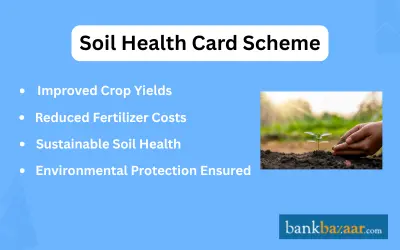Soil Health Card Scheme 2026
What is the Soil Health Card Scheme?
Launched in 2015 by the Government of India, the Soil Health Card Scheme is an ambitious agricultural initiative aimed at promoting sustainable farming and increasing crop productivity. The scheme provides Indian farmers with detailed information about the nutrient status of their soil so they can make informed decisions about fertilizers, irrigation, and crop selection.

Features of the Soil Health Card Scheme
- Scientific Soil Testing: Soil samples are collected from farms and tested in government-approved laboratories.
- Customized Fertilizer Advice: The card provides recommendations for the right kind and quantity of nutrients needed.
- Bi-annual Testing Cycle: Each farmer gets a card once every two years to track changes in soil health.
- Government Support: The scheme is fully funded by the central government to benefit small and marginal farmers.
How Does It Work?
- Sample Collection: Soil samples are collected at the grid level (2.5 hectares for irrigated, 10 hectares for rainfed).
- Testing and Analysis: Samples are tested for key parameters like Nitrogen (N), Phosphorus (P), Potassium (K), pH level, organic carbon, etc.
- Report Generation: Based on the test results, the Soil Health Card is prepared.
- Card Distribution: Farmers receive the card along with guidance on nutrient management.
Benefits of the Soil Health Card Scheme
- Improved Crop Yields: By knowing exactly what their soil needs, farmers can improve crop productivity.
- Cost Savings: Avoiding the excessive use of fertilizers helps farmers save money.
- Environmental Protection: Reduces the overuse of chemical fertilizers, leading to better soil and water health.
- Long-term Soil Health: Encourages balanced fertilization and sustainable agricultural practices.
How to Apply for Soil Health Card Scheme
Step 1 - Visit your nearby agriculture office, KVK, or soil testing lab.
Step 2 - Provide your Aadhaar number, land records, and mobile number.
Step 3 - The staff will either collect the soil sample from your farm or guide you to do it.
Step 4 - The sample is tested in a government lab for nutrients and pH level.
Step 5 - You will get a card with the test results and fertilizer suggestions.
Step 6 - Go to soilhealth.dac.gov.in to track or download your card.
Why is Soil Health So Important?
Soil is the foundation of agriculture. Healthy soil leads to healthy crops. But years of chemical fertilizer misuse and lack of awareness have degraded Indian soils. By assessing and improving soil health, farmers can restore soil fertility, reduce input costs, and achieve higher incomes
Achievements and Impact
Since its launch, millions of Soil Health Cards have been distributed across India. States like Uttar Pradesh, Maharashtra, and Tamil Nadu have reported a positive impact in terms of better yield and cost savings for farmers.
Success Story:
A farmer in Punjab reported a 20% increase in wheat yield after following the Soil Health Card recommendations. Similar success stories are emerging from various parts of the country.
How Farmers Can Access their Soil Health Cards
- Contact the nearest Krishi Vigyan Kendra (KVK) or agriculture office.
- Participate in local awareness camps and training programs.
- Visit the official Soil Health Card portal https://soilhealth.dac.gov.in for more information.
Popular Pages in Government Schemes

Disclaimer
Credit Card:
Credit Score:
Personal Loan:
Home Loan:
Fixed Deposit:
Copyright © 2026 BankBazaar.com.